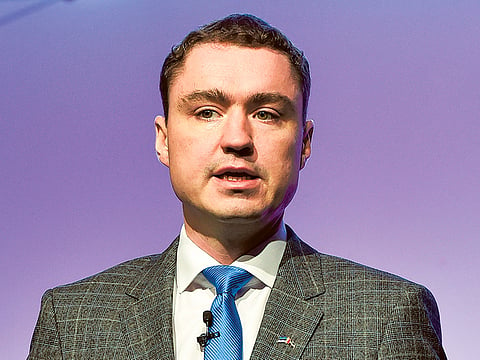Why Dubai is looking to Estonia to develop a digital city
Estonian PM is in Dubai this week to meet with government officials and speak at Gitex Technology Week

Dubai: Estonian Prime Minister Taavi Roivas, who is in Dubai this week to meet with members of the UAE government, addressed the Gitex Technology Week conference on Tuesday on how his country, “e-Estonia,” became digital.
Estonia, which lies on the Baltic Sea and shares a border Russia, is a country about half the size of the UAE. In the past 25 years since breaking from free of the Soviet Union after the Iron Curtain fell, Estonia has emerged as one of the most advanced countries in the world.
The Baltic state has embraced the digital age. In 1999 and 2000, it trained 100,000 Estonians to be computer literate. Today, 99 per cent of Estonians are banking online, it takes around 5 minutes online to do a tax return, and earlier this year Estonians in 116 countries voted online in parliamentary elections.
“By doing that we believe we can create stability, we can create growth, these things are very much needed to have an ambitious small country punching above its weight,” he said.
The digital age has also given the Estonian government an “opportunity to not bother citizens too much” and to encourage foreign direct investment.
It takes just one day to establish a business in Estonia, Roivas said, “usually just a couple of hours.” The record is 18 minutes. All the applications are done online. Estonia is ranked 8th on the Index of Economic Freedom. The UAE is ranked 25th.
In Estonia, if you go to the doctor for a prescription, it is uploaded online and can be collected from any pharmacy in the country. There is no physical paper. Prime Minister Roivas said he hopes that one day Estonians on holiday would be able to phone their doctor in Estonia and collect their prescription from a pharmacy in Dubai.
But a challenge, the prime minister admits, is getting the people to trust the government in storing personal data, such as address and income, on a digital identification card.
“Bit by bit, you have to explain,” Roivas said, pointing out that while the tax office may need to know your address and income, it does not need to be shared with you doctor.
The digital age has also saved a significant amount of money for the small country, whose population is about half that of Dubai’s. The digital identification cards, each with their own personal digital signatures, are used instead of physically signing documents. Roivas said 95 per cent of the document he signs as prime minister are done digitally. This digital signature has saved the country around 2 per cent of gross domestic product (GDP) each year, Roivas said, the same amount Estonia spends on defence.
In developing this digital European country, Roivas said it needed a strong political will. Something that he said he sees in Dubai.
“I saw the determination of the leaders here [in the UAE] to create a digital society that has been done before,” he said.
The prime minister will sign agreements with the Dubai government during his visit covering skills and knowledge and experience transfer, he told Gulf News after his speech.
Dubai, along with other emirates in the UAE, is aggressively pursuing a smart city concept that has seen nearly every government department develop mobile applications in a bid to improve customer service. This week at Gitex, the Dubai government has unveiled a happiness count that it says will gauge the happiness of residents and citizens in the UAE.
Sign up for the Daily Briefing
Get the latest news and updates straight to your inbox



